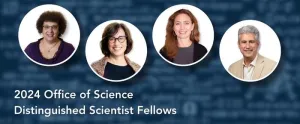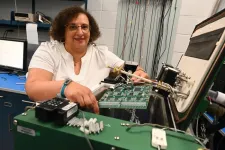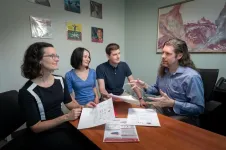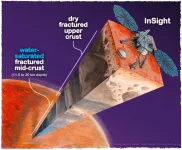(Press-News.org) ChatGPT and other large language models (LLMs) cannot learn independently or acquire new skills, meaning they pose no existential threat to humanity, according to new research from the University of Bath and the Technical University of Darmstadt in Germany.
The study, published today as part of the proceedings of the 62nd Annual Meeting of the Association for Computational Linguistics (ACL 2024) – the premier international conference in natural language processing – reveals that LLMs have a superficial ability to follow instructions and excel at proficiency in language, however, they have no potential to master new skills without explicit instruction. This means they remain inherently controllable, predictable and safe.
This means they remain inherently controllable, predictable and safe.
The research team concluded that LLMs – which are being trained on ever larger datasets – can continue to be deployed without safety concerns, though the technology can still be misused.
With growth, these models are likely to generate more sophisticated language and become better at following explicit and detailed prompts, but they are highly unlikely to gain complex reasoning skills.
“The prevailing narrative that this type of AI is a threat to humanity prevents the widespread adoption and development of these technologies, and also diverts attention from the genuine issues that require our focus,” said Dr Harish Tayyar Madabushi, computer scientist at the University of Bath and co-author of the new study on the ‘emergent abilities’ of LLMs.
The collaborative research team, led by Professor Iryna Gurevych at the Technical University of Darmstadt in Germany, ran experiments to test the ability of LLMs to complete tasks that models have never come across before – the so-called emergent abilities.
As an illustration, LLMs can answer questions about social situations without ever having been explicitly trained or programmed to do so. While previous research suggested this was a product of models ‘knowing’ about social situations, the researchers showed that it was in fact the result of models using a well-known ability of LLMs to complete tasks based on a few examples presented to them, known as `in-context learning’ (ICL).
Through thousands of experiments, the team demonstrated that a combination of LLMs ability to follow instructions (ICL), memory and linguistic proficiency can account for both the capabilities and limitations exhibited by LLMs.
Dr Tayyar Madabushi said: “The fear has been that as models get bigger and bigger, they will be able to solve new problems that we cannot currently predict, which poses the threat that these larger models might acquire hazardous abilities including reasoning and planning.
“This has triggered a lot of discussion – for instance, at the AI Safety Summit last year at Bletchley Park, for which we were asked for comment – but our study shows that the fear that a model will go away and do something completely unexpected, innovative and potentially dangerous is not valid.
“Concerns over the existential threat posed by LLMs are not restricted to non-experts and have been expressed by some of the top AI researchers across the world."
However, Dr Tayyar Madabushi maintains this fear is unfounded as the researchers' tests clearly demonstrated the absence of emergent complex reasoning abilities in LLMs.
“While it's important to address the existing potential for the misuse of AI, such as the creation of fake news and the heightened risk of fraud, it would be premature to enact regulations based on perceived existential threats,” he said.
“Importantly, what this means for end users is that relying on LLMs to interpret and perform complex tasks which require complex reasoning without explicit instruction is likely to be a mistake. Instead, users are likely to benefit from explicitly specifying what they require models to do and providing examples where possible for all but the simplest of tasks.”
Professor Gurevych added: "… our results do not mean that AI is not a threat at all. Rather, we show that the purported emergence of complex thinking skills associated with specific threats is not supported by evidence and that we can control the learning process of LLMs very well after all. Future research should therefore focus on other risks posed by the models, such as their potential to be used to generate fake news."
ENDS.
Video explainer Dr Madabushi describes his findings: https://tinyurl.com/vvhx38kp
END
AI poses no existential threat to humanity – new study finds
Large language models like ChatGPT cannot learn independently or acquire new skills, meaning they pose no existential threat to humanity.
2024-08-12
ELSE PRESS RELEASES FROM THIS DATE:
Routine lab tests are not a reliable way to diagnose long COVID
2024-08-12
A National Institutes of Health (NIH)-supported study has found that routine lab tests may not be useful in making a long COVID diagnosis for people who have symptoms of the condition. The study, part of NIH’s Researching COVID to Enhance Recovery (NIH RECOVER) Initiative and published in the Annals of Internal Medicine, highlights how challenging it can be to identify and diagnose a novel illness such as long COVID.
“Our challenge is to discover biomarkers that can help us quickly and accurately diagnose long ...
Tracking the color of light
2024-08-12
Since the first demonstration of the laser in the 1960s, laser spectroscopy has become an essential tool for studying the detailed structures and dynamics of atoms and molecules. Advances in laser technology have further enhanced its capabilities. There are two main types of laser spectroscopy: frequency comb-based laser spectroscopy and tunable continuous-wave (CW) laser spectroscopy.
Comb-based laser spectroscopy enables extremely precise frequency measurements, with an accuracy of up to 18 digits. This remarkable precision led to ...
Common mechanisms underpinning neurodevelopmental disorders and psychiatric diseases
2024-08-12
Recent large-scale epidemiologic studies have increasingly suggested that aberrant brain development and psychiatric disorders may share common mechanisms. The interplay between genetic variants and environmental stress has been shown to significantly impact genome integrity, reshaping brain development. This can result in changes to neural networks, which are linked to neurodevelopmental and psychiatric disorders—areas where many questions remain unresolved.
For more information, visit: bit.ly/4ddJSV0
For contributing article to this research topic, visit: bit.ly/4crNG41
Please use the Hot-Topic Code: BMS-CMP-2024-HT-33 ...
Department of Energy announces 2024 Office of Science Distinguished Scientist Fellows and lecture series
2024-08-12
WASHINGTON, D.C. – Four of the nation’s top scientists have each been awarded $1 million in direct funding via the Department of Energy (DOE) Office of Science Distinguished Scientist Fellows program.
The program was established to develop, sustain, and promote scientific and academic excellence in Office of Science (SC) research through collaborations between universities and national laboratories.
The awards, authorized by the America COMPETES act, are bestowed on senior national laboratory scientists. The United States has ...
Mary Bishai named Distinguished Scientist Fellow
2024-08-12
UPTON, N.Y. — Physicist Mary Bishai of the U.S. Department of Energy’s (DOE) Brookhaven National Laboratory has been named a 2024 DOE Office of Science Distinguished Scientist Fellow. The honor recognizes her “enduring contributions at the intensity frontier of high energy physics in unraveling fundamental properties of neutrinos, extraordinary leadership and service to the particle physics community, and deep commitment to broadening participation through mentoring next generation scientists.”
As described in a DOE Office of Science press release issued today, the ...
Can meditation and stretching relieve cramping caused by cirrhosis?
2024-08-12
People suffering from cirrhosis may find some symptom relief from two accessible activities: stretching and meditation.
A study from the University of Michigan compared the two therapies as a means to relieve nocturnal muscle cramps and found both effective.
The resulting paper, “The RELAX randomized controlled trial: Stretching versus meditation for nocturnal muscle cramps,” appeared in Liver International.
The study
Two out of every three people with cirrhosis experience muscle cramps at night that wake them from sleep.
Since ...
Study reveals oleoyl-ACP-hydrolase underpins lethal respiratory viral disease
2024-08-12
Respiratory infections can be severe, even deadly, in some individuals, but not in others. Scientists at St. Jude Children’s Research Hospital, the Peter Doherty Institute for Infection and Immunity and other collaborators have gained new understanding of why this is the case by uncovering an early molecular driver that underpins fatal disease. Oleoyl-ACP-hydrolase (OLAH) is an enzyme involved in fatty acid metabolism. A study, published today in Cell, shows that OLAH drives severe disease outcomes.
The important role of OLAH in immune response has gone unrecognized for several reasons, including a lack of noticeable expression in healthy ...
Advances in drug delivery carrier microwave-assisted reactions for enhanced therapeutics and diagnostic purposes
2024-08-12
Microwave irradiation technology is emerging as a powerful tool in the fields of organic synthesis, pharmaceuticals, and nanocarrier development. Recently, microwave-assisted reactions have gained significant attention for their effectiveness in synthesizing drug delivery carriers. This technology offers notable advantages, including high yield, shorter reaction times, and improved compound purity, making it a promising approach for developing nanoparticles with enhanced physicochemical properties and bioavailability.
For more information, please visit: bit.ly/3SFk4cf
For contributing article in this research topic, visit: bit.ly/3WXyoza
Use ...
Presence of liquid water most probable explanation for data collected by mars lander
2024-08-12
Data about Mars’ planetary crust gathered from the Mars InSight lander are best explained by the conclusion that the crust has stores of liquid water.
Analysis led by Vashan Wright, a geophysicist at UC San Diego’s Scripps Institution of Oceanography, provides the best evidence to date that the planet still has liquid water in addition to that frozen at its poles. If that conclusion is true, it sets the stage for new research considering the planet’s habitability and continuing a search for life that exists on a place other than Earth. The potential presence of liquid water on Mars has tantalized scientists for decades. Water is essential for a habitable planet.
“Understanding ...
Scientists find oceans of water on Mars. It's just too deep to tap.
2024-08-12
Using seismic activity to probe the interior of Mars, geophysicists have found evidence for a large underground reservoir of liquid water — enough to fill oceans on the planet's surface.
The data from NASA's Insight lander allowed the scientists to estimate that the amount of groundwater could cover the entire planet to a depth of between 1 and 2 kilometers, or about a mile.
While that’s good news for those tracking the fate of water on the planet after its oceans disappeared more than 3 billion years ago, the reservoir won't be of much use to anyone trying to tap into it to supply a future Mars colony. It's ...
LAST 30 PRESS RELEASES:
Stem cells from human baby teeth show promise for treating cerebral palsy
Chimps’ love for crystals could help us understand our own ancestors’ fascination with these stones
Vaginal estrogen therapy not linked to cancer recurrence in survivors of endometrial cancer
How estrogen helps protect women from high blood pressure
Breaking the efficiency barrier: Researchers propose multi-stage solar system to harness the full spectrum
A new name, a new beginning: Building a green energy future together
From algorithms to atoms: How artificial intelligence is accelerating the discovery of next-generation energy materials
Loneliness linked to fear of embarrassment: teen research
New MOH–NUS Fellowship launched to strengthen everyday ethics in Singapore’s healthcare sector
Sungkyunkwan University researchers develop next-generation transparent electrode without rare metal indium
What's going on inside quantum computers?: New method simplifies process tomography
This ancient plant-eater had a twisted jaw and sideways-facing teeth
Jackdaw chicks listen to adults to learn about predators
Toxic algal bloom has taken a heavy toll on mental health
Beyond silicon: SKKU team presents Indium Selenide roadmap for ultra-low-power AI and quantum computing
Sugar comforts newborn babies during painful procedures
Pollen exposure linked to poorer exam results taken at the end of secondary school
7 hours 18 mins may be optimal sleep length for avoiding type 2 diabetes precursor
Around 6 deaths a year linked to clubbing in the UK
Children’s development set back years by Covid lockdowns, study reveals
Four decades of data give unique insight into the Sun’s inner life
Urban trees can absorb more CO₂ than cars emit during summer
Fund for Science and Technology awards $15 million to Scripps Oceanography
New NIH grant advances Lupus protein research
New farm-scale biochar system could cut agricultural emissions by 75 percent while removing carbon from the atmosphere
From herbal waste to high performance clean water material: Turning traditional medicine residues into powerful biochar
New sulfur-iron biochar shows powerful ability to lock up arsenic and cadmium in contaminated soils
AI-driven chart review accurately identifies potential rare disease trial participants in new study
Paleontologist Stephen Chester and colleagues reveal new clues about early primate evolution
UF research finds a gentler way to treat aggressive gum disease
[Press-News.org] AI poses no existential threat to humanity – new study findsLarge language models like ChatGPT cannot learn independently or acquire new skills, meaning they pose no existential threat to humanity.




